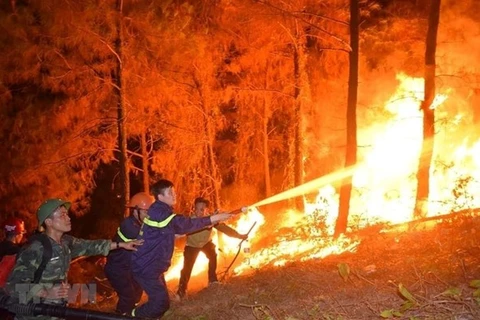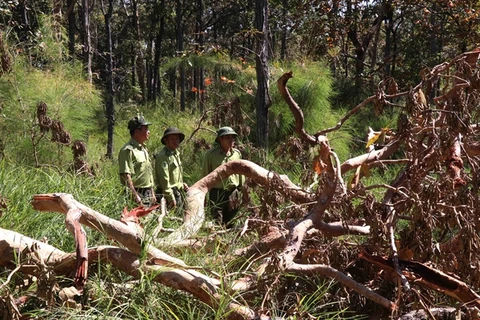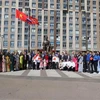Hanoi (VNA) – The encroachment and illegal use of forestry land and free migration, if left unsettled, will cause significant losses to national resources, say insiders.
At a national scientific conference to seek solutions to land-related disputes to ensure sustainable development in the Central Highlands region, experts held that this is still a “hot” problem, with some cases being unsolvable.
Encroachment after reclamation
According to Dr. Cao Thi Ly from Tay Nguyen University, disputes in the use of forestry land are often associated with deforestation, encroachment and free migration. The problem has drawn special attention from the Government in recent years.
In terms of management, although legal documents on the settlement and administrative punishment of violations to laws related to forest and land have been issued, they have not been coherent with the assignment of specific responsibility in State management over forest land.
In many cases, the reclamation of forestry land failed due to the resistance of people, or the land was encroached again after being reclaimed. Over the years, in the Central Highlands region, many officials have been disciplined or expelled from their positions as punishment, but the deforestation and illegal use of forest land have continued in many places.
Authorised agencies have shown ineffective coordination in investigating and settling deforestation and other violations such as illegal wood trading and transporting, and encroachment of forestry land, leading to the defying of law, held Dr. Ly.
Meanwhile, Dr. Truong ThiHanh from the Institute for Social Sciences in the Central Highlands region, said that the encroachment and dispute of land have been an urgent problem. But, for various reasons, the situation has still been underway with complicated developments, she noted.
She cited that in 2017 and 2018, the region saw more than 1,800 cases of deforestation, including 1,200 cases with the purpose of creating farmland, causing a loss of 700 hectares of forest of all kinds.
Hanh pointed to the uncontrolled migration and a lack of farming land as one of the reasons behind the situation.
In 1975, the population in the region was only 1 million, but that figure rose to more than 5.8 million in 2019, with about 3 million, or 50 percent of the total, being uncontrolled migrants, she noted, concluding that the shortage of farming land has become more severe.
Currently, the Central Highlands is home to about 52,940 households who need 24,075 hectares of farming land. Dak Lak leads regional localities in the number of households suffering land shortage with about 6,591 hectares.
Alongside, Hanh also clarified another reasons leading to land disputes and complaints – the provoking and incitement from hostile forces at home and abroad.
Regarding objective reasons, Hanh held that one of them is the shortcomings in leadership and State management over land-related issues in localities, as well as the modest capacity and irresponsibility of officials in forestry companies and forest management boards. Many violations take an extensive amount of time to settle.
Drastic policies needed to prevent uncontrolled migration
In this context, Hanhsaid that it is necessary to design drastic measures to minimise and stabilise the uncontrolled migration. The Government should roll out mechanisms and policies to support people to settle down, thus boosting the socio-economic development in northern mountainous provinces, while approving a programme to allocate and stablise migrants in disaster-hit and border localities, thus limiting and putting an end to the free migration to Central Highlands region, she added.
Local governments in northern mountainous localities should tighten the management of the population, while encouraging people to stay and develop homeland, she said, adding that the localities should also coordinate closely with the five Central Highlands provinces.
On the other hand, Central Highlands localities should give a specific timeline for migrants to settle down, with policies that restrict space for new migrants, cutting down policies to support and provide land to them, thus preventing them from entering the region.
At the same time, ministries, sectors and localities should speed up the issuance of certificates for land use rights, the handing over of land and forest in line with the law. They should focus on thoroughly dealing with land encroachment and disputes, while inspecting forestry companies and forest management boards, proposed Hanh.
Sharing Hanh’s opinions, Assistant Prof. Dr. Nguyen Quang Tuyen from the Hanoi Law University said that in order to cope with the land disputes and ensure sustainable forest development in the region, it is necessary to reform the mindset and solve problems related to farming and residential land for ethnic minority groups who have resided in the region for generations.
He proposed a ban on transferring land to people from other ethnic groups.
According to Tuyen, the ban aims to prevent the trading of land between Kinh migrants and those from ethnic minority groups. He also underlined the need to revoke land bought or appropriated by local officials and return it to locals.
Phan Van Vuong, Vice Chairman of the Democracy-Law Committee under the Vietnam Fatherland Front Central Committee, advised the Government, ministries and agencies as well as localities to tackle hot spots of land disputes as well as those inciting and taking advantages of uncontrolled migrants to destroy protective and special-use forests that causes disorder in society, politics and defence in localities, especially those in border areas.
The authorities in the five Central Highland provinces should promote communications to raise public awareness of the Party and State’s policies, especially among ethnic minority communities. It is crucial to direct townships and communes as well as forest owners to give stricter management over the area, residence and forest, avoiding illegal land trading.
Trieu Van Binh from the Department of Ethnic Affairs under the National Assembly Office proposed the strengthening of Party leadership over the settlement of complaints related to forestry land disputes while enhancing the coordination among authorised agencies from the central to local levels in solving land-related disputes and complaints.
He also highlighted the need to persistently implement the land planning that was approved by the NA, while comparing them with the planning of the development of areas for rubber and coffee farming as well as hydropower projects./.
























